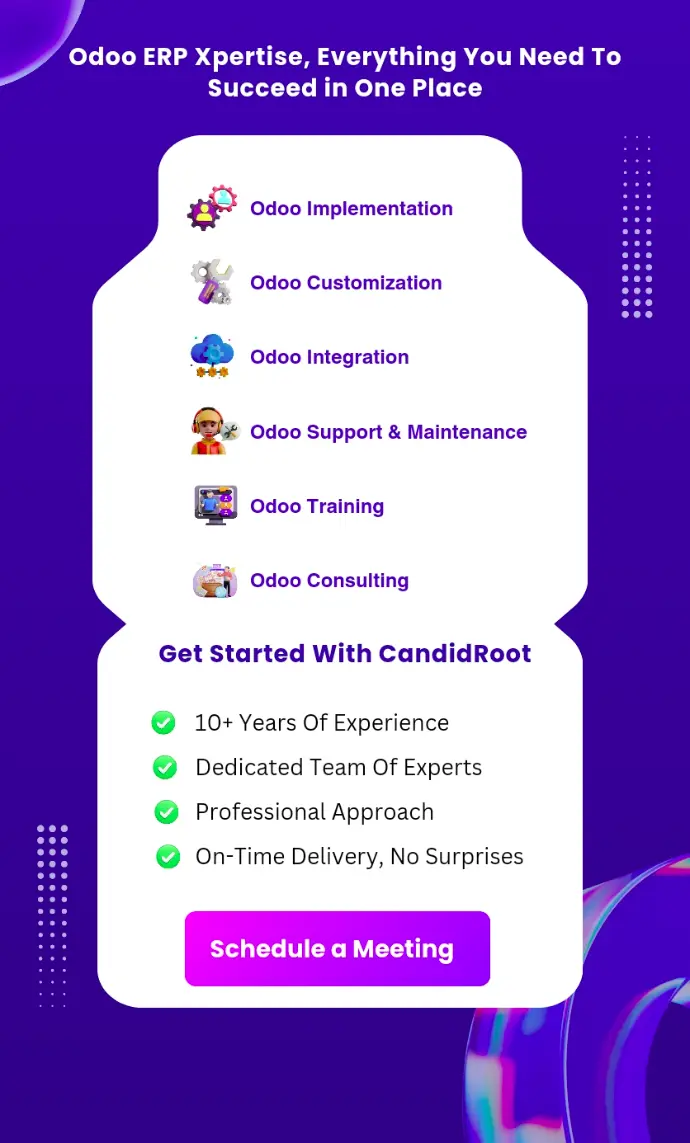Understanding Odoo's Security Framework
Odoo, an open-source ERP platform, boasts a robust security framework designed to protect your sensitive business information. The security features within Odoo include:
1. Authentication and Authorization
Odoo employs strong authentication mechanisms to ensure that only authorized personnel can access the system. User roles and permissions can be finely tuned, restricting access to specific modules and functionalities based on job responsibilities.
2. Data Encryption
Sensitive data is encrypted during transmission, preventing unauthorized access during communication between the server and clients. This encryption, typically implemented using secure protocols like HTTPS, adds an extra layer of protection against data breaches.
3. Access Control Lists (ACLs)
Access Control Lists in Odoo allow administrators to define granular permissions for users. This means that even within a module, you can control who can view, edit, or delete specific records. This fine-grained control enhances security by limiting access to data on a need-to-know basis.
4. Audit Trails
Odoo maintains comprehensive audit trails, logging every action performed within the system. This includes user logins, data modifications, and system configurations. The audit trails serve as a valuable tool for tracking user activities and investigating potential security incidents
Continuous Improvement and Updates
Odoo's commitment to security is evident in its regular updates and patches. The development team actively addresses vulnerabilities, releasing updates to fortify the system against emerging threats. Staying current with Odoo updates is crucial for businesses to benefit from the latest security enhancements.
Best Practices for Odoo Security
While Odoo provides a secure foundation, users play a pivotal role in maintaining a safe environment. Adopting best practices such as:
Regularly updating Odoo: Ensure that your Odoo instance is running the latest version to leverage security improvements.
Strong password policies: Encourage users to create complex passwords and update them regularly.
User training: Educate your team on security awareness, emphasizing the importance of safeguarding access credentials and recognizing phishing attempts.
Unlocking Odoo's Security Secrets: A Dive into OWASP Concerns
Have you ever wondered how secure your web applications are? The Open Web Application Security Project (OWASP) sheds light on the top security issues, and today, we're exploring how Odoo, a popular ERP platform, addresses these concerns.
1. Injection Flaws: Dodging SQL Threats
Injection flaws, especially SQL injections, are common in web applications. Odoo tackles this head-on with an Object-Relational Mapping (ORM) framework. This framework abstracts query building, preventing manual SQL queries. Parameters are always properly escaped, making injection attacks a distant worry.
2. Cross-Site Scripting (XSS): Shielding Against Script Shenanigans
XSS flaws arise when applications send user-supplied data to a browser without proper validation. Odoo has your back by default: it escapes all expressions in views and pages, thwarting XSS attempts. Developers can mark expressions as "safe" for direct inclusion into pages, adding an extra layer of protection.
3. Cross-Site Request Forgery (CSRF): Keeping Requests Legitimate
CSRF attacks coerce a victim's browser into sending forged requests. Odoo's website engine boasts built-in CSRF protection. Each POST request requires a corresponding security token, ensuring that only legitimate requests pass through. This prevents attackers from hijacking sessions and creating havoc.
4. Malicious File Execution: Defending Against Code Mischief
Code susceptible to remote file inclusion can lead to severe server compromises. Odoo takes a stand by not exposing functions for remote file inclusion. While privileged users can customize features, the system evaluates expressions in a sandboxed environment, limiting access to permitted functions.
5. Insecure Direct Object Reference: Navigating Safely
Insecure direct object references happen when internal references are exposed in URLs. Odoo's access control operates beyond the user interface, minimizing risks associated with exposing internal objects. Every request must pass through the data access validation layer, ensuring security.
6. Insecure Cryptographic Storage: Safeguarding Sensitive Data
Inadequate use of cryptographic functions can lead to identity theft. Odoo secures user passwords using industry-standard hashing (PKFDB2 + SHA-512, with key stretching). For added protection, external authentication systems like OAuth 2.0 or LDAP can be employed, eliminating the need to store passwords locally.
7. Insecure Communications: Encrypting Data on the Move
Odoo Cloud defaults to HTTPS, ensuring encrypted network traffic. For on-premise installations, running Odoo behind a web server with encryption is recommended. Odoo's deployment guide includes a Security checklist for safer public deployments.
8. Failure to Restrict URL Access: A Layered Defense
Some applications protect sensitive functionality by hiding URLs. Odoo takes a different approach. Access control is not UI-dependent, and every request undergoes data access validation. Special URLs, like those for order confirmations, are digitally signed and sent via email for added security.
Odoo's commitment to security shines through its robust measures, aligning with best practices to keep your business data safe and sound.
Conclusion:
In the realm of ERP solutions, Odoo stands out not only for its functionality but also for its commitment to security. By understanding and implementing the built-in security features and following best practices, businesses can confidently leverage Odoo to streamline operations while keeping their valuable data safe from potential threats.
In the ever-evolving landscape of cybersecurity, businesses need to stay vigilant and proactive. By combining the inherent security features of Odoo with a robust cybersecurity strategy, businesses can enjoy the benefits of an efficient ERP system without compromising on data safety.
In collaboration with CandidRoot Solutions, Odoo's commitment to security shines through its robust measures, aligning with best practices to keep your business data safe and sound. Stay secure, stay confident with Odoo!


